Frankenstein Created Woman (1967)
Directed by: Terence Fisher
Written by: Anthony Hinds
Starring: Peter Cushing, Robert Morris, Susan Denberg, Thorley Walters
UK
AVAILABLE ON BLU-RAY AND DVD
RUNNING TIME: 92 min
REVIEWED BY: Dr Lenera, Official HCF Critic
As a boy, Hans Werner witnesses his father’s hanging for murder. Years later, he’s working as an assistant to Baron Victor Frankenstein, who is also being helped by the alcoholic Dr Hertz. He’s trying to determine whether or not the soul departs the body at the point of death, and thinks he may be able to transfer the soul of a dead person into another recently deceased body to restore it to life. Hans’s girlfriend Christina, who is disfigured on her left side, is taunted by some dandies who are expelled from the pub where she works but later return to accidentally kill Christina’s father. Hans is blamed and executed, and, seeing this as an opportunity, Frankenstein gets hold of Hans’ fresh corpse and traps his soul. Then the heartbroken Christina drowns herself….
To my mind Frankenstein Created Woman is neck and neck with Frankenstein Must Be Destroyed [made two years later] as the best Hammer Frankenstein film. I do think that the 1969 flick is a little better overall, but there’s not much in it, and Frankenstein Created Woman might be my favourite. Both pictures are downbeat and nihilistic, but this one also has a fairy tale quality about it, even a tragic beauty. Bearing no resemblance whatsoever to Bride Of Frankenstein, it actually takes the very scientific, matter of fact, distinctly unsexy Frankenstein franchise into more fantastical and sensual waters, and almost belongs more in the world of Dracula than Frankenstein [as well as looking forward to Dr Jekyll And Sister Hyde], which could be one reason why this one tends to get mixed responses [though no less than Martin Scorsese has expressed his love for it], but one certainly can’t criticise Hammer for sticking precisely to formula here. They really tried to go down some different pathways, even if – as was usual for them – the result could have explored its possibilities and interesting themes a bit more. Nonetheless, parts of the story are often very touching, and it’s nice that a female character is the most prominent person in the film, while this film is also one of the most visually impressive and artistic looking of the studio’s efforts from the second half of the 1960’s.
The notoriously sexy Brigitte Bardot starrer And God Created Woman inspired producer Anthony Hinds to jokingly create the title Frankenstein Created Woman as a potential follow-up to 1958’s The Revenge Of Frankenstein. This was then forgotten about until The Evil Of Frankenstein was released in 1964 and Hammer immediately announced Fear Of Frankenstein until Hinds resurrected Frankenstein Created Woman. Just before shooting at Bray [and the usual nearby countryside including – of course – Black Park], Hinds removed scenes of two funerals and a jailer gloating at Hans about to be killed from the script, trimmed a murder scene, and changed Christina’s final suicide to be drowning again rather than stabbing. Austrian starlet Susan Denberg was involved with drugs and would often arrive on set in a very bad shape. Alan MacNaughton, playing Christina’s father, adopted an Austrian accent so it matched Denberg’s, but she was then dubbed into a more natural English by who else but Nikki Van der Zyl who had already dubbed Ursula Andress, Raquel Welch and half the cast of Prehistoric Women – so MacNaughton had to re-voice himself! Some photographs of Peter Cushing with Denberg suggested that the film was originally racier film than actually released, but these were simply publicity shots. It was intended to support the delayed Prehistoric Women, but ended up being double billed with The Mummy’s Shroud to decent commercial success. Denberg was reported the following year as having died from a drug overdose, and this has been repeated over the years. I remember reading an issue of a fanzine magazine dedicated to her around a couple of decades ago that lamented her passing. In fact, she’s still alive now.
The opening shot of a guillotine appropriately leads us into the opening scene. The man being led to execution is drunk and laughs off what’s happening to him until he sees his young son Hans [how many Hammer characters are called Hans and Karl?] witnessing the show and desperately tries to get him to leave, though Hans still sees the death peering from a bush. It’s quite a grim beginning and lets us know that this won’t be a happy tale. Frankenstein is introduced seemingly dead inside a coffin put in some kind of freezer, having just proved that the soul keeps the body alive for an hour, and now needing to be revived. He amusingly fails to understand why his assistants – the adult Karl and Dr. Dr Hertz – were worried about him, though I was busy wondering how on earth this follows on from The Evil Of Frankenstein. At the end of that film, Frankenstein was burnt to death in a fire, but here only his hands seem to be damaged so he can’t use them. The rest of his body is fine, but I guess it’s possible that he had a new body hanging around as he did at the end of The Revenge Of Frankenstein – but then why are his hands still burnt? Anyway, the film then begins to centre more on poor Christina. Her innkeeper father doesn’t want her seeing Hans because he’s a murderer’s son, but the two are secret lovers anyway [times have obviously now moved on and our young couples can now be seen sharing a bed – in fact this was probably encouraged]. Very poignantly, Christina blows out the candle in her room before they can have sex, so Karl can’t see her deformities.
The villains of this film are three arrogant young toffs who order the pub landlord around and constantly humiliate his daughter. When they sing a mocking song outside her window, one really feels like Hans and wants to teach them a lesson. Anton and Karl are truly unpleasant characters you can’t help but hate, though Johann seems a little less bad. There’s not a bad set-to in the pub with Hans taking on all three of the reprobates, but he’s soon blamed for Christina’s father’s murder and after a rather farcical trial is guillotined just like his dad. I can never understand why Anton doesn’t just say that he was with Christina on the night of the murder – surely any possible reasons for doing this can’t be as important as saving his own life? Never mind, he’s not dead for long – kind of. Frankenstein and Hertz remove his soul – and we actually see it, a flowing white orb – though the film is a little choppy around this point as if some footage has been removed. Christina then kills herself [see, it’s all a bit depressing really], but the good doctors put Hans’s soul inside her, bringing her back to life as well as making her beautiful. Christina promptly sets about seducing and killing the three villains in some superbly staged and paced set pieces full of suspense where director Terence Fisher really shows off his mastery of such scenes. Saying that, it’s a bit disappointing that Anton, the ringleader and cruelest of the three, is dispatched first, and it’s also very convenient that she knows exactly where the victims-to-be are, even managing to guess that Johann would be in a particular coach and even that it would break down. Frankenstein isn’t even punished [except for his experiments having gone wrong yet again – will he ever learn?] at the end of this story, the film finishing with Christina dead for the second and probably final time, and Frankenstein mighty peed off.
The screenplay by Anthony Hinds screenplay never quite works out the details of Christina’s possession by Karl, and the elements of sexual ambiguity are left unexplored, but then this is a film which seems to be partly anti-God yet which embraces the concept of the soul. The scene of Hans’s head on the end of Christina’s bed ‘talking’ to her is a memorably unnerving image though. The effect is done simply by pasting, and looks quite good, though the severed heads elsewhere are of the usual Hammer low standard and you barely see anything during Christina’s killings, the camera cutting away at the point of impact. The intent was to try to make a more subtle Frankenstein film than normal and it mostly works. Of course Frankenstein is typically cold. The first time he takes the ‘new’ Christina out he brings her straight to the gallows to see if Hans’s personality will materialise, and after Christina’s traumatic reaction thinks nothing of trying more of such ‘tests’ on the poor creature and has to be restrained from doing so by Hertz. When he does seem to show some emotion at bad occurrences it’s only because stuff is getting in the way of his ‘work’. The fact that his experiments end up righting some wrongs is just luck. His methods are even more vague than normal and, what with also his bizarre little laboratory, seem closer to alchemy than science. These scenes are also interesting from a visual point of view, but then the whole movie is excellently photographed by Arthur Grant with strong use of colour in many scenes, perhaps most notably when Christina is about to kill Anton and is in a red-dominated room, climaxing in a long distance shot of her bathed in the colour. Meanwhile Fisher also seems to be on top form, with the usual precise framing intercut with some quicker cut scenes than normal and even some rapid zooms.
Cushing once again is magnificent, especially when he shows Frankenstein’s exasperation at his aides not being anywhere near as clever as he is. His Frankenstein is almost a variation on Sherlock Holmes, a person so intellectually superior to those around him that it pains him that everybody else seems so thick by comparison. Thorley Walters shines in probably his best Hammer role, even though the part is rather like Dr. Zargo in Rasputin The Mad Monk. He plays especially well some moments where he seems to have a little crush on Christina. Denberg is better as the deformed Christina than the beautiful one, though acquits herself reasonably well throughout. James Bernard provides one of his best scores for Hammer. His theme for Christina is full of sadness, though the composer sometimes has the minor key piece played on a major key at fleeting moments of happiness. The other main musical is a doom laden phrase used to great effect during the murder set pieces where the composer helps to ramp up the tension so well. All the motifs are expertly used and well defined. One feels that, despite some things in the screenplay that weren’t quite worked out, everyone really tried their best with Frankenstein Created Woman to make a good film. The result may be a little flawed but also manages to be both rather artistic and and to have some real heart to it.

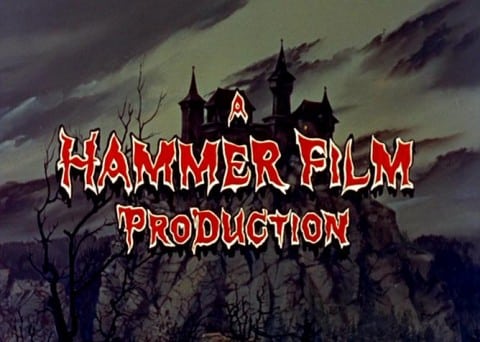
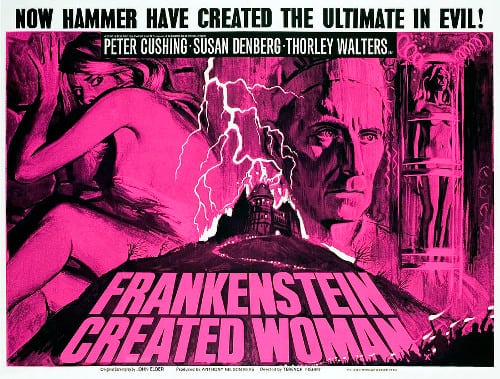
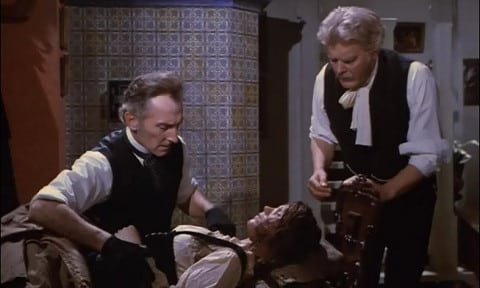
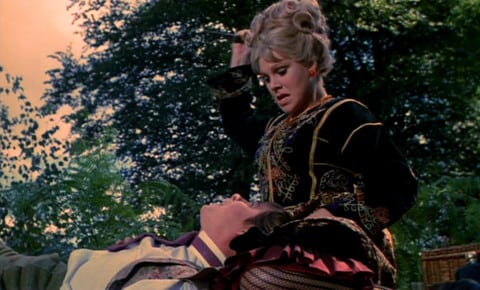



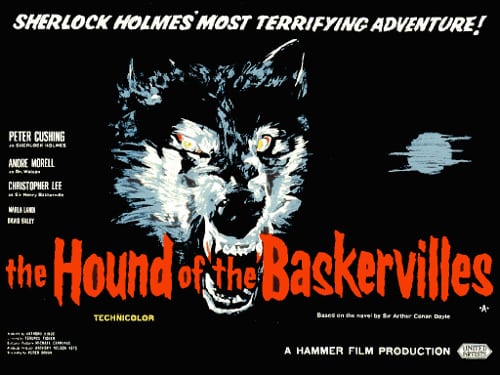
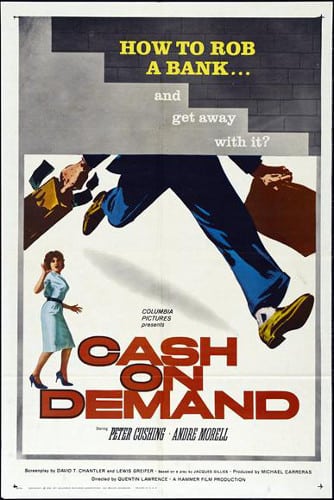
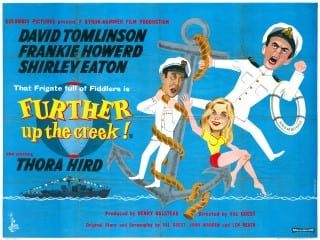
Be the first to comment